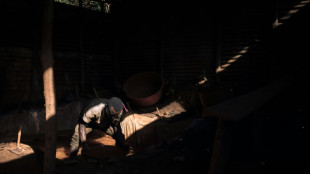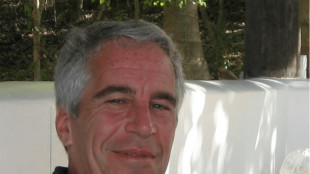
-
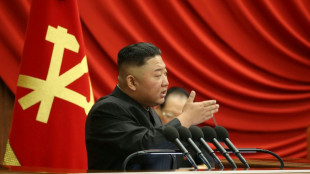 Diplomacy, nukes and parades: what to watch at North Korea's next party congress
Diplomacy, nukes and parades: what to watch at North Korea's next party congress
-
Arsenal, Man City eye trophy haul, Macclesfield more FA Cup 'miracles'
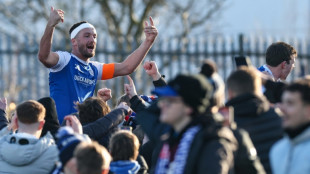
-
 Dreaming of glory at Rio's carnival, far from elite parades
Dreaming of glory at Rio's carnival, far from elite parades
-
Bangladesh's BNP heading for 'sweeping' election win
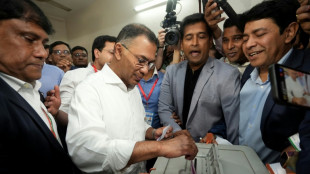
-
 Hisatsune grabs Pebble Beach lead with sparkling 62
Hisatsune grabs Pebble Beach lead with sparkling 62
-
Venezuela amnesty bill postponed amid row over application
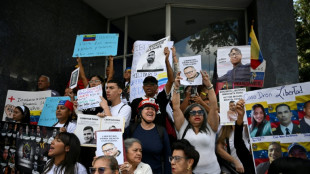
-
 Barca taught 'lesson' in Atletico drubbing: Flick
Barca taught 'lesson' in Atletico drubbing: Flick
-
Australia's Liberals elect net zero opponent as new leader

-
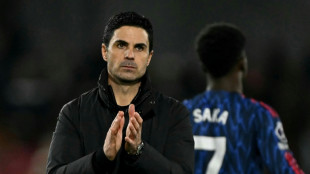 Arsenal must block out noise in 'rollercoaster' title race: Rice
Arsenal must block out noise in 'rollercoaster' title race: Rice
-
Suns forward Brooks banned one game for technical fouls

-
 N. Korea warns of 'terrible response' if more drone incursions from South
N. Korea warns of 'terrible response' if more drone incursions from South
-
LA fires: California probes late warnings in Black neighborhoods

-
 Atletico rout Barca in Copa del Rey semi-final first leg
Atletico rout Barca in Copa del Rey semi-final first leg
-
Arsenal held by Brentford to offer Man City Premier League title hope
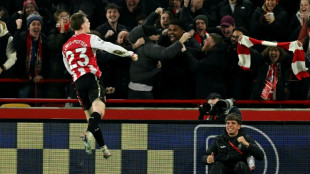
-
 US snowboard star Kim 'proud' as teenager Choi dethrones her at Olympics
US snowboard star Kim 'proud' as teenager Choi dethrones her at Olympics
-
Chloe Kim misses Olympic milestone, Ukrainian disqualfied over helmet

-
 Tech shares pull back ahead of US inflation data
Tech shares pull back ahead of US inflation data
-
'Beer Man' Castellanos released by MLB Phillies

-
 Canada PM to join mourners in remote town after mass shooting
Canada PM to join mourners in remote town after mass shooting
-
Teenager Choi wrecks Kim's Olympic snowboard hat-trick bid

-
 Inter await Juve as top guns go toe-to-toe in Serie A
Inter await Juve as top guns go toe-to-toe in Serie A
-
Swiatek, Rybakina dumped out of Qatar Open

-
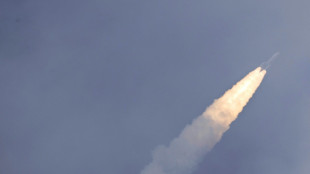 Europe's most powerful rocket carries 32 satellites for Amazon Leo network into space
Europe's most powerful rocket carries 32 satellites for Amazon Leo network into space
-
Neighbor of Canada mass shooter grieves after 'heartbreaking' attack

-
 French Olympic ice dance champions laud 'greatest gift'
French Olympic ice dance champions laud 'greatest gift'
-
Strange 'inside-out' planetary system baffles astronomers

-
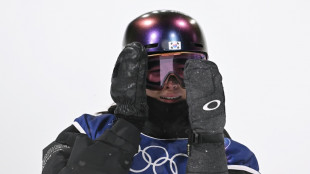 Teenager Choi denies Kim Olympic snowboard hat-trick
Teenager Choi denies Kim Olympic snowboard hat-trick
-
Swiss bar owners face wrath of bereaved families

-
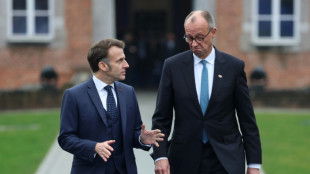 EU vows reforms to confront China, US -- but split on joint debt
EU vows reforms to confront China, US -- but split on joint debt
-
Rubio heads to Munich to heap pressure on Europeans
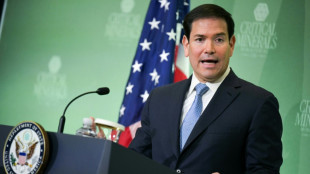
-
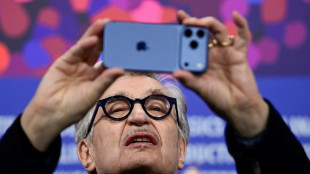 Less glamour, more content, says Wim Wenders of Berlin Film Fest
Less glamour, more content, says Wim Wenders of Berlin Film Fest
-
What is going on with Iran-US talks?

-
 Wales 'means everything' for prop Francis despite champagne, oysters in France
Wales 'means everything' for prop Francis despite champagne, oysters in France
-
Giannis out and Spurs' Fox added to NBA All-Star Game
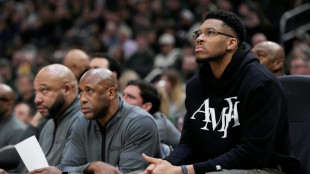
-
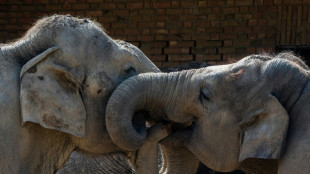 The secret to an elephant's grace? Whiskers
The secret to an elephant's grace? Whiskers
-
Chance glimpse of star collapse offers new insight into black hole formation

-
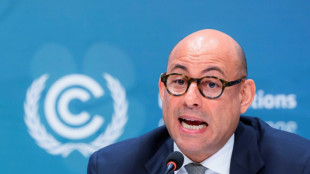 UN climate chief says 'new world disorder' threatens cooperation
UN climate chief says 'new world disorder' threatens cooperation
-
Player feels 'sadness' after denied Augusta round with grandsons: report
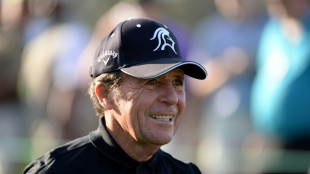
-
 Trump dismantles legal basis for US climate rules
Trump dismantles legal basis for US climate rules
-
Former Arsenal player Partey faces two more rape charges

-
 Scotland coach Townsend adamant focus on England rather than his job
Scotland coach Townsend adamant focus on England rather than his job
-
Canada PM to visit town in mourning after mass shooting

-
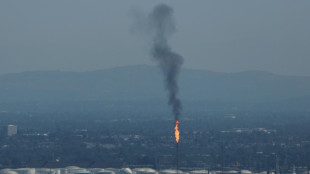 US lawmaker moves to shield oil companies from climate cases
US lawmaker moves to shield oil companies from climate cases
-
Ukraine says Russia behind fake posts targeting Winter Olympics team

-
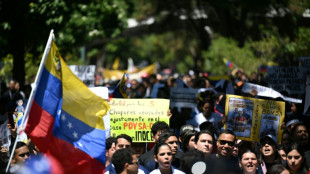 Thousands of Venezuelans stage march for end to repression
Thousands of Venezuelans stage march for end to repression
-
Verstappen slams new cars as 'Formula E on steroids'
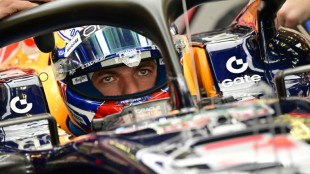
-
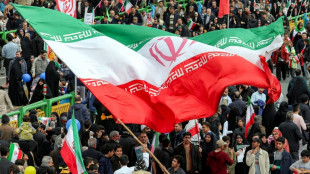 Iranian state TV's broadcast of women without hijab angers critics
Iranian state TV's broadcast of women without hijab angers critics
-
Top pick Flagg, France's Sarr to miss NBA Rising Stars
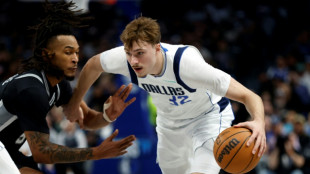
-
 Sakkari fights back to outlast top-seed Swiatek in Qatar
Sakkari fights back to outlast top-seed Swiatek in Qatar
-
India tune-up for Pakistan showdown with 93-run rout of Namibia
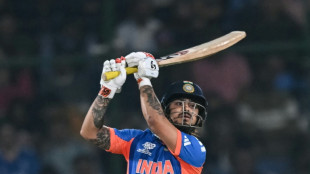

How a German war film disarmed Oscar voters despite woes at home
When "All Quiet on the Western Front" first premiered back in September, there was little to suggest it was about to wage an all-out campaign for Oscar votes.
The German-language World War I film comes from Netflix, which had a roster of far more expensive "prestige" movies primed for Academy Award pushes, from Oscar-winning director Alejandro Gonzalez Inarritu's "Bardo" to the star-studded "Glass Onion: A Knives Out Mystery."
But while those have largely fallen by the wayside, with one nomination each, "All Quiet" has emerged from the crowded trenches of awards season hopefuls as an Oscars frontrunner, with nine nods, including for much-coveted best picture honors.
"It really feels like a wave of joy and luck that has come over us," director Edward Berger told AFP, days before his film won seven prizes at Britain's BAFTAs, including best film.
"We're very grateful for that... it's a German war movie!"
Indeed, Berger's film is the third screen adaptation of Erich Maria Remarque's seminal novel about naive young German soldiers confronted with the horrors of war -- but the first shot in the author's native language.
Had he been asked, the director "would have immediately said no" to making another English-language version.
Luckily, the decision to flip the script was helped by Netflix's wildly successful expansion into new global markets with recent subtitled hits such as South Korean series "Squid Game" and Oscar-winning film "Roma."
The movie's eventual $20 million price tag was comparatively small change for the streaming giant, but a huge sum in the German film industry.
"We wouldn't have gotten the type of budget that you need to make this film five years ago," said Berger.
The film's best picture Oscar nomination is the first for any German-language movie.
- Creative license -
Ironically, the film has been far better received outside of the German-speaking world than it has at home, where many reviewers savaged it.
In particular, critics slammed Berger's decision to depart from Remarque's text, which -- with 50 million copies sold worldwide, and the legacy of being banned by the Nazis -- holds hallowed status in Germany today.
Unlike the novel, the film portrays tense armistice peace talks with French generals. It also omits a section in which one of its war-hardened heroes visits home but cannot readjust to civilian life.
"I don't follow it very closely... that's part of the journalist's job -- to observe, criticize," shrugged Berger.
"I felt licensed to make those changes" because "why make it the same?" he added.
To encapsulate the "physical difference" between the film's reception at home and overseas, Berger pointed to one especially harrowing scene towards the end of the movie.
A key character is fatally bayoneted through the back -- a moment which Berger intended to be heartbreaking and brutal, but not necessarily unexpected, given the novel's fame and the war's unfathomable death toll.
Yet at the film's world premiere in Toronto last year, "there was a loud gasp in the audience," he recalled.
"I was so surprised, because I didn't plan on this... In Germany, that didn't happen," said Berger.
"As Germans, we expect -- in a German movie about war -- you cannot have a hero. You cannot have people be successful in the mission. You almost cannot have a soldier survive," he said.
By contrast, "in America, you're used to the hero. You want them to come out positively, and you cling on to the hope that your hero is going to change the world."
- 'Shame and responsibility and guilt' -
In any case, Berger did not sign up out of any sense of patriotic duty. The film and the original anti-war novel are both stridently against jingoism of any stripe.
"We wanted to make a very German movie -- but we are not making it for the country," he said.
"I'm not a patriot. Germans have a difficult relationship with patriotism, or pride or honor, about their history or country. So I'm not in that business."
Instead, filming in German offered "an outer stamp of authenticity" and a deeper sense of the "shame and responsibility and guilt" many Germans feel about history, said Berger.
Whatever happens at the Oscars ceremony on March 12, "All Quiet" clearly left an indelible impact on voters at the US-based Academy of Motion Picture Arts and Sciences.
It is seen as a shoo-in for the best international feature statuette, a strong possibility for best picture, and its nine Oscar nominations are one short of the all-time record for a foreign-language movie.
"Were we surprised? Of course," said Berger. "I mean, you can't count on something like that."
N.Awad--SF-PST


